HISTORY
HISTORY

Since antiquity, the 14 islands which constitute the archipelago of the Dodecanese, were bound by the fortune of the Greek Nation. However, it was not until 1947 that they were integrated into the national body and the Greek state.
Due to their geographical location, the Dodecanese were raided by the Persians, Saracens, Venetians, Genoese, Crusaders and Turks (Seljuks and Ottomans). In 1309 they were occupied by Knights Hospitaller and remained under their occupation until 1522, when they were occupied by the Ottoman Turks. Upon the beginning of the national liberation struggle of 1821, the Dodecanese revolted, but in 1830, along with Samos, they were once again under the rule of the Ottoman Empire, in exchange for Euboia, which was integrated into the free Greek state.
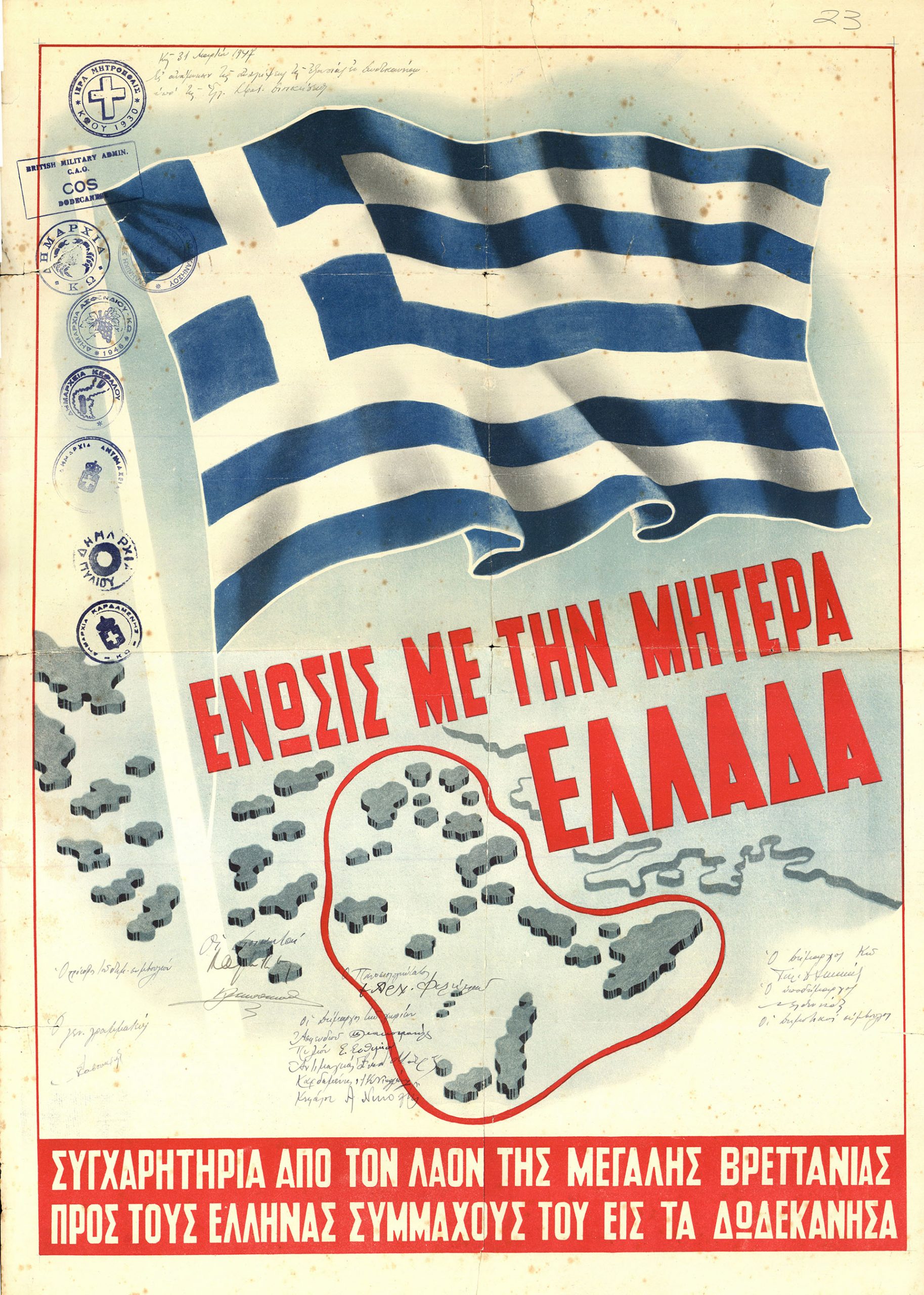
Congratulatory poster for the union of the Dodecanese with Greece (Archive of the Council of Elders of Symi).
In 1912, when the Italians occupied the Dodecanese, the hopes of their inhabitants were revived that soon the islands would be integrated into the Greek state. Thus, with the Treaty of Sevres on August 10, 1920, the Dodecanese were ceded to Greece, with the exception of Rhodes, which would remain under Italian rule. However, the unfortunate outcome of the Asia Minor campaign gave the Italians the opportunity to retreat and with the rise of Mussolini they tried to eliminate them. However, after the capitulation of the Italians in 1943, the Dodecanese came under German rule and, following the surrender of Hitler’s Germany in May 1945, they became a colony of Great Britain.
Also read: September 23, 1821 | The fall of Tripoli and the consolidation of the Revolution
This was the golden opportunity for the Dodecanese to integrate into the Greek state, which Greek diplomacy should not let go. It was a demand of the Greek people and a lot of Greek blood had been shed for the expulsion of the Germans from the Dodecanese. The issue would be finally resolved by the Peace Conference of the victorious powers of World War II, which would meet in Paris.
The then Prime Minister of Greece, Konstantinos Tsaldaris, said that he would put the acquisition of Northern Epirus and the Dodecanese, the settlement of the Greek-Bulgarian border on the negotiating table as national claims, while he intended to raise the issue of Cyprus to Great Britain. Of these four national claims, only the issue of the Dodecanese was successful, without any difficulties or complications.
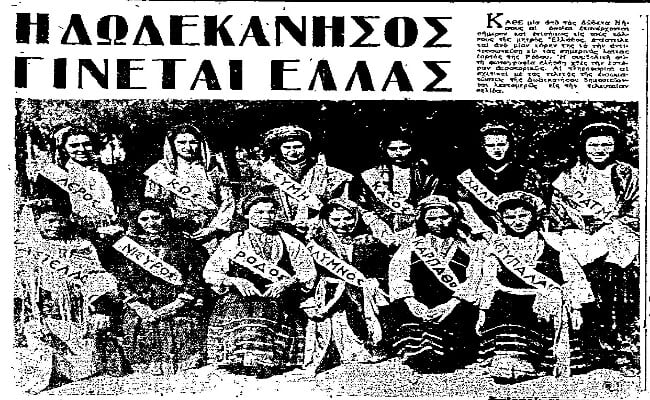
Newspaper title of the time
The news about the integration of the Dodecanese in Greece was hailed with great enthusiasm, at a time when the country was in a civil war. The Peace Conference met in Paris from July 29 to October 11, 1946, where the Greek side also raised the issues of Northern Epirus and the settlement of the Greek-Bulgarian border, without success, as the US did not want to upset its ally, the Soviet Union, and the satellites of Albania and Bulgaria.
On February 10, 1947, the Peace Treaty with Italy was signed in Paris, according to which the Dodecanese were ceded to Greece, while Italy was obliged to compensate Greece with 105 million dollars. Due to the obsession of the Soviet side, the text provided that the islands would remain demilitarized, something that Turkey abusively invoked after 1974. From the Turkish interpretation of the text of the Greek-Italian treaty of 1947, along with the Italian-Turkish agreements of 1932, the issue of the “gray zones” raised by Ankara after the Imia Crisis in 1996 will also arise.
The handover ceremony of the Dodecanese to Greece by the British authorities took place on March 31, 1947 in Rhodes in a festive atmosphere. The first commander of the Dodecanese was Vice Admiral Pericles Ioannidis, with academic and judge Michael Stasinopoulos, later president of the Hellenic Republic, as his political advisor. The official integration ceremony took place on March 7, 1948 and in 1955 the Dodecanese became a prefecture with Rhodes as their capital.
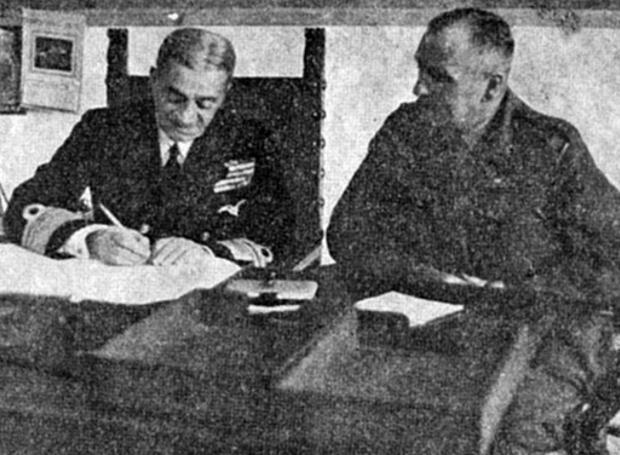
Rear Admiral Pericles Ioannidis signs the protocol of surrender of the Dodecanese.
Also read: October 9, 1912 | Greek fleet liberates Lemnos and seizes control of the Dardanelles – Photo Gallery
With information from: Sansimera.gr
NEWSLETTER SUBSCRIPTION
Memorial Speech by the Minister of Defence Vassilis Palmas at the annual memorial service for the fallen of the 3rd Company of the 211th Infantry Battalion
The Minister of Defence of the Republic of Cyprus, Mr. Vassilis Palmas, attended the annual commemoration of the fallen of the 3rd…
120 years since the death of Pavlos Melas—The Hero of the Macedonian Struggle—Photos
The Armed Forces honor the memory of the ethnic martyr who gave his life for the liberation of Macedonia…
80 years since the Battle of Rimini – The Brigade that wrote golden pages of history
The “Rimini Brigade” wrote new pages of history for Greece, placing it in the camp of the winners. This success was linked to hope and…
MBDA – Matra Electronique | Joint creation of a centre of excellence for defence electronics in Europe
MBDA and its subsidiary Matra Electronique (MEL), which specialises in manufacturing high-precision electronic equipment, jointly…
THEON International | New orders amounting to €74 million having already exceeded €150 million in the 4th trimester
THEON INTERNATIONAL PLC (THEON) announced additional orders for the month of November. As a result of the…
UN | Iran has increased uranium enrichment to near weapons-grade levels
Iran has further increased its stockpile of uranium enriched to near weapons-grade levels, defying international pressure, according to…
Brazil | Arrests of military and police officers for plotting the assassination of President Lula
Brazilian police have arrested five officers accused of plotting a coup which included plans to overthrow the government following the…
Sweden | Leaflets with survival instructions in the midst of the Ukrainian crisis
Sweden started sending out five million leaflets to the country’s residents yesterday, urging them to prepare for a possible conflict…
Ukraine | The first ATACMS strike on Russian soil took place
The Ukrainian armed forces carried out their first strike on a border area within Russian territory with an ATACMS missile.












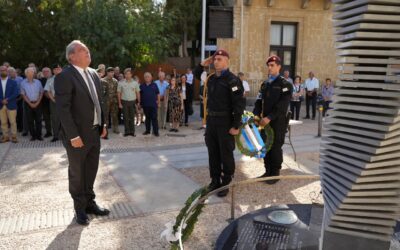

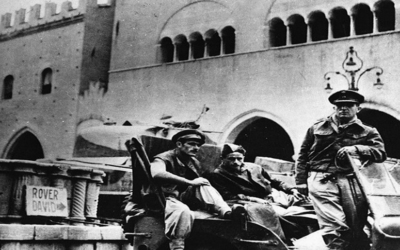


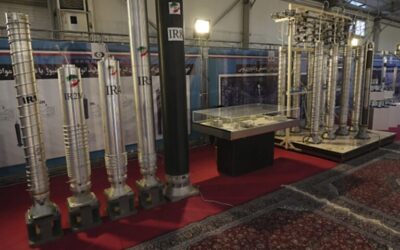


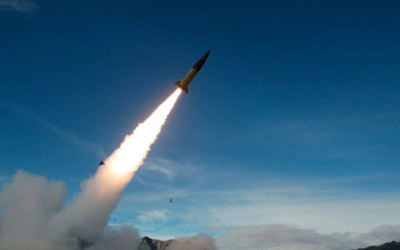
0 Comments